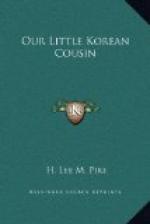On this journey, however, Yung Pak and his companions were to ride on ponies.
The Korean ponies are small, fine-coated animals, little larger than Shetland ponies. They are very tough and strong, and can endure long marches with little food. They are sometimes obstinate and are desperate fighters, squealing and neighing on all occasions. They often attack other ponies, and never become friendly with each other on a journey. In their attacks upon one another loads are forgotten and often seriously damaged. Notwithstanding, they bear with much patience a great deal of abuse from unkind masters. Because of much beating and overloading, they are generally a sorry-looking lot of animals.
Ki Pak had to engage ponies for himself, Yung Pak, and Wang Ken. He was also obliged to employ a cook for the journey, who had to have a pony to carry along the kettles and pans and other utensils. It was also necessary to hire body-servants and several ponies to carry luggage, and as each pony must have a mapu, or groom, it made quite a procession when the party started out of Seoul on the journey to the northeast.
It was a fine day when the start was made. It was not early in the morning, for, if there is anything a Korean hates to do, it is to make an early start on a journey. If you had been in Yung Pak’s place, you would have gone crazy with impatience. The servants were late in bringing around the ponies, and the process of loading them was a very slow one.
But Yung Pak had long before learned to be patient under such circumstances. In fact, he seemed to care little whether the start were made in the morning or at noon. He calmly watched the servants at their work, and, when at last all was declared ready, he gravely mounted his pony and fell into the procession behind his father, with Wang Ken immediately following.
A most comical sight was the cook, perched on top of his load of pans, pots, and potatoes. As his pony trotted along with the others, it looked as if the cook was in constant danger of a fall from his lofty seat, but he sat as calm and unconcerned as one could imagine.
You would laugh if you should see the strings of eggs hanging across this pony’s back—yes, eggs. They were packed in bands of wheat straw, and between each pair of eggs a straw was twisted. Thus a straw rope enclosing twenty or more eggs, well protected, was made and thrown over the top of the load.
Other riders had more comfortable seats, for most of the ponies carried baggage in two wicker baskets,—one strapped upon each side,—and on top of these was piled bedding and wadded clothing, which made a soft seat for the rider.
The mapus who accompanied the procession were dressed in short cotton jackets, loose trousers, with sandals and cotton wrappings upon the feet. They had to step lively to keep up with the ponies.
All the people in this company carried with them long garments made of oiled paper. You have already learned that the Korean paper is very tough, and when soaked with oil it forms a splendid protection against the rain. Many of these garments had a very peculiar appearance, because they were made of paper on which had been set copies for schoolboys to use in learning to write.




